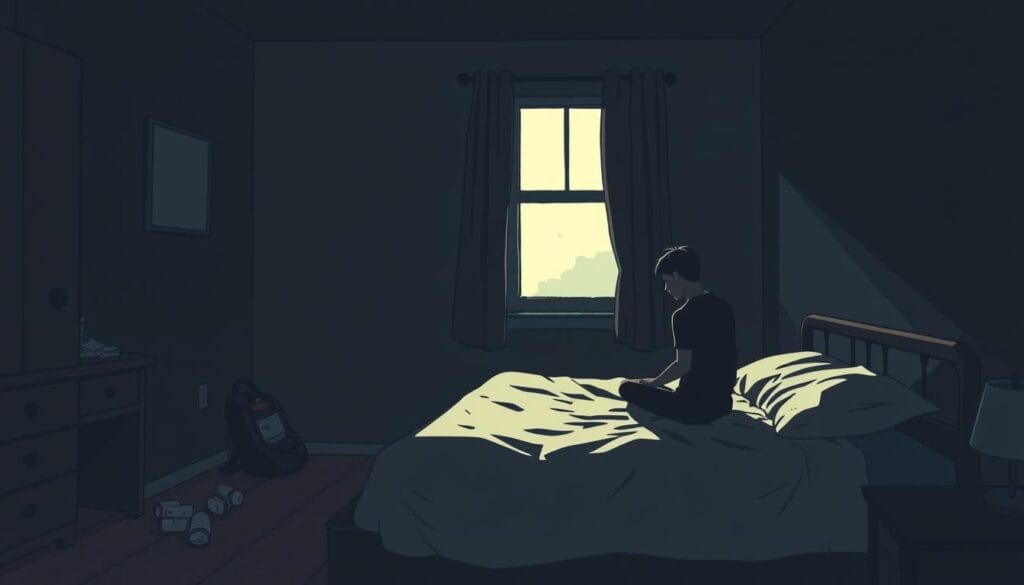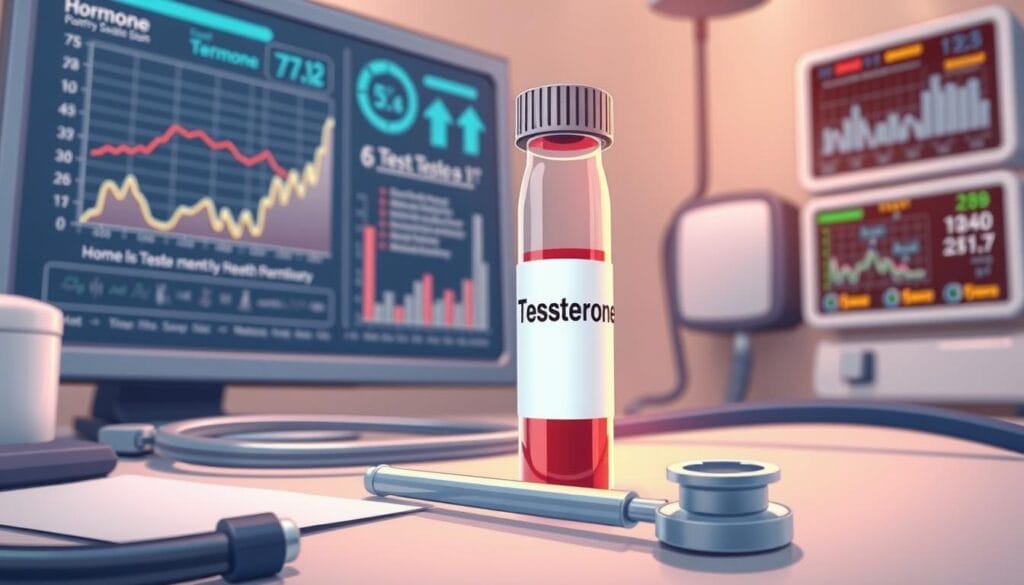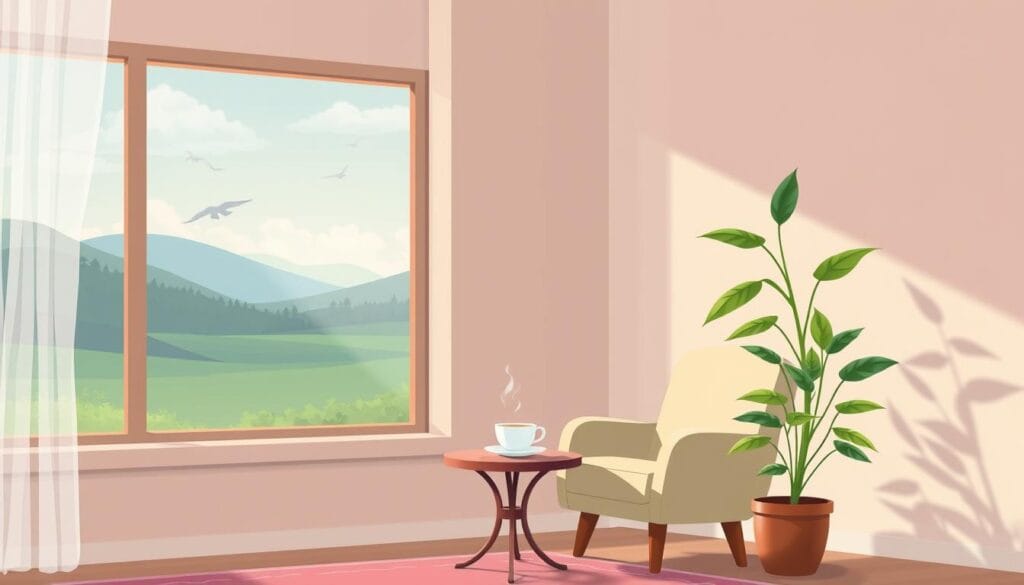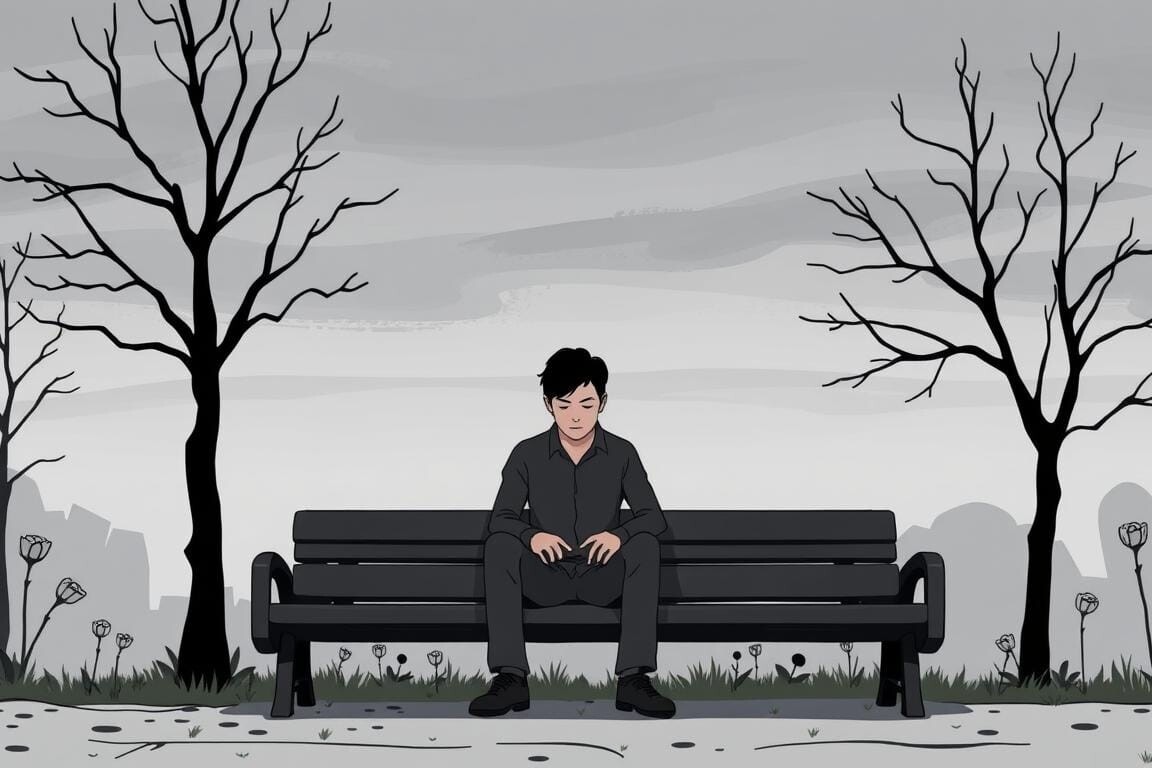Have you ever felt unusually tired, irritable, or lost interest in things you once enjoyed? What if the cause isn’t just stress or aging, but something deeper – a hormonal shift that often goes unnoticed?
Low testosterone and depression in men is a serious and often hidden link that many ignore until it’s too late.
In this blog, we will explain how testosterone affects your mental health, why it’s not “just aging,” and how early action can save your mood, energy, and relationships. If you’re feeling “off,” read this carefully. It might be the missing piece in your health puzzle.
Table of Contents
ToggleUnderstanding Testosterone and Its Role in Men’s Health
Before diving into the link between hormones and mental health, let’s understand what testosterone does for men.
What is Testosterone?
Testosterone is a hormone made mainly in the testicles. It controls many male traits and body functions. From facial hair and muscle mass to sex drive and mood, it plays a big part in your everyday life.
- Helps build and maintain muscles
- Supports a healthy sex drive (libido)
- Controls sperm production
- Affects mood and brain function
If testosterone levels drop, these functions can be disrupted. And over time, it can take a toll not only on your body but also your mind.
Also Read: Foods That Cause Penis Odor: Dr. Good Deed’s Guide to Managing It
Why Testosterone Declines with Age
Testosterone doesn’t stay steady forever. In fact, it naturally declines as you get older.
- Most men see about a 1% drop per year after age 30
- By age 60, many men have low levels without even knowing it
Here’s a simple chart showing how testosterone typically drops with age:
| Age Range | Average Testosterone Level (ng/dL) |
|---|---|
| 20-30 | 600-700 |
| 31-40 | 500-600 |
| 41-50 | 400-500 |
| 51-60 | 300-400 |
| 60+ | 250-350 |
This steady drop can lead to physical and emotional changes in men, which many mistake as just “getting older.”

Common Symptoms of Low Testosterone in Men
Men often live with low T (testosterone) for years without realizing it. Here are the most common signs:
- Feeling tired all the time (fatigue)
- Loss of interest in sex (low libido)
- Trouble building or keeping muscle
- Foggy thinking or poor memory (brain fog)
- Mood swings, sadness, or lack of motivation
According to the American Urological Association, about 2 in 10 men over age 60 have low testosterone. And many aren’t diagnosed or treated.
Causes of Low Testosterone in Men
Let’s now understand why testosterone levels drop. It’s not always age alone.
Age-related decline (Andropause)
Just like women go through menopause, men go through andropause. This is the natural drop in male hormones as they age.
- Begins around age 30
- Slowly reduces testosterone by 1% each year
- Can lead to both physical and mental issues over time
Lifestyle Factors
How you live plays a huge role in your hormone levels. Common causes of low testosterone include:
- Being overweight or obese
- Chronic stress from work or relationships
- Poor diet low in nutrients
- Alcohol or drug abuse
Fixing your lifestyle can often help improve your hormone balance.
Medical Conditions
Certain health issues can cause low testosterone:
- Type 2 diabetes (insulin resistance harms hormone production)
- Sleep apnea (disrupts hormone cycles during sleep)
- Chronic diseases like kidney or liver issues
These medical problems also raise the risk of depression.
Low Testosterone and Depression in Men – What’s the Connection?
Now let’s look at how low testosterone and depression in men are connected. This is not just a theory. It’s backed by science and real cases.
How Hormones Affect Brain Chemistry?
Hormones like testosterone don’t just affect your muscles or sex life. They also help keep your brain in balance.
- Testosterone boosts dopamine and serotonin, two brain chemicals that affect happiness and motivation
- Low testosterone can reduce these levels, leading to low testosterone and mood disorders
- It affects brain areas linked to motivation, memory, and focus
When testosterone drops, so does your brain’s “feel-good” chemistry. That’s why many men with low T feel sad, anxious, or numb.
Evidence from Clinical Studies
Research shows a strong link between low T and mental health:
- A 2020 meta-analysis found that men with low testosterone had higher depression scores
- Men who received testosterone replacement therapy and depression treatment saw better mood results than those on antidepressants alone
- In some cases, testosterone therapy alone improved mood without needing extra meds
These findings prove that the mind and body are closely connected.
Depression Symptoms Often Overlap with Low T
Many signs of depression and low testosterone are the same. This can confuse both doctors and patients.
| Symptom | Seen in Depression | Seen in Low T |
| Low energy / fatigue | Yes | Yes |
| Sadness or low mood | Yes | Yes |
| Poor sleep | Yes | Yes |
| Low sex drive | Sometimes | Yes |
| Trouble focusing | Yes | Yes |
| Irritability or anger | Yes | Yes |
According to JAMA Psychiatry, men with low testosterone are 2 to 3 times more likely to have clinical depression.

How to Know if Low Testosterone is Affecting Your Mood?
You might wonder: is it low T or something else? Let’s talk about how to find out.
Self-assessment Questions
Ask yourself:
- Do I feel tired all day?
- Is my sex drive much lower than before?
- Am I feeling down, numb, or irritable?
- Am I gaining weight or losing muscle?
- Am I forgetting things or feeling foggy?
If you answered yes to 3 or more, it’s time to speak to a doctor.
Medical Diagnosis
Doctors use simple tests to check your hormone levels:
- Blood test: Measures total and free testosterone
- Depression screening tools: Checks your mood symptoms
- Hormone panel: Checks other hormones that may affect mood
Yet, only 5% of men with low testosterone ever get diagnosed or treated. Don’t be part of that 95%.
Treatment Options for Low Testosterone and Depression in Men
You can do something about it. There are many safe ways to treat low testosterone and depression in men.
Lifestyle Modifications
Small changes make a big difference:
- Exercise: Resistance training boosts testosterone naturally
- Healthy diet: Foods rich in zinc, vitamin D, and healthy fats
- Stress control: Better sleep, meditation, and less screen time
These changes help fix both body and mood.
Read: Best Multivitamin for Men: How to Choose the Right One for Your Health
Testosterone Replacement Therapy (TRT)
TRT replaces lost testosterone using:
- Gels or creams (applied to skin)
- Injections (weekly or monthly)
- Pellets (inserted under skin)
Benefits:
- Boosts mood and focus
- Improves energy and sex drive
- Increases muscle mass
Risks:
- Can affect fertility
- May cause acne or oily skin
- Needs regular monitoring
A study in Psychoneuroendocrinology found that 56% of men on TRT had better mood within 6–8 weeks.
Read: Boost Male Fertility: Top Strategies & Tips
Antidepressants vs TRT – Or Both?
Some men may need both treatments:
- SSRIs help balance brain chemicals
- TRT helps restore hormone balance
- Combining them may offer better results than either alone
A doctor can help you decide what’s best for your body.
Mental Health Support Beyond Hormones
Medicine isn’t the only solution. Mental health care matters too.
Read: Men’s Health and Mental Health: Why It Matters
Therapy and Counseling
Talking helps. Especially for men who keep emotions inside.
- CBT (Cognitive Behavioral Therapy) teaches new thinking patterns
- Helps men express emotions in healthy ways
- Breaks stigma around asking for help
Role of Support Systems
You’re not alone.
- Talk to your family and involve them
- Join men’s health groups or online forums
- Share your story to help others
The Impact of Low Testosterone on Mental Health
Men’s well-being is closely tied to low testosterone and mental health. Testosterone is key for both physical and mental health.
Research shows a clear link between low testosterone and mental issues. This includes depression, anxiety, and mood swings. 34% of men with low testosterone face major depression and mood disorders. Symptoms like fatigue, low libido, and trouble focusing can really affect your life.
But, there’s hope. Treating low testosterone and its mental health effects can greatly improve your life. Testosterone Replacement Therapy (TRT) can boost your mood, focus, and energy. It also makes you feel better overall.
Changing your lifestyle is also important. Eating well, exercising, managing stress, and staying connected with friends can help. These steps, along with TRT, can help you feel better mentally and physically.
If low testosterone is affecting your mood, get help. Healthcare experts can guide you to the right treatment. Don’t let low testosterone hold you back. Take control of your health today.
Breaking the Stigma: Why Men Often Suffer in Silence?
Too many men ignore their symptoms due to shame or fear.
Societal Pressure and “Toughness”
Boys are told to “man up.” This can be dangerous.
- Many men don’t talk about their feelings
- They hide depression until it’s serious
- Hormone changes are often mistaken for weakness
Why Early Diagnosis Can Save Lives
Men with depression are more likely to take extreme steps, like suicide.
- Depression in men often shows as anger, not tears
- Emotional pain hides behind physical complaints
- Testing early can prevent tragedy
Seeking Professional Help for Depression
If you’re struggling with depression, getting help is key. A doctor or mental health expert can check your symptoms and health. They’ll suggest the best treatment, like lifestyle changes, counseling, or medicine.
Don’t be afraid to ask for help. Getting treatment early can greatly improve your life. Depression affects many men, and sadly, some die from it. Asking for help shows you’re strong, not weak.
There are many resources to support you. Talking to a mental health professional can help you understand your depression. They can also teach you ways to manage your feelings. Medicines and therapies like TMS and ECT are options for severe cases.
Self-help methods like meditation and exercise can also help. Remember, you’re not alone in this fight. Asking for help is the first step to a better life.
Start by talking to an expert like Dr. Chandril Chugh, a US-trained neurologist who treats both mind and body together.

Take the First Step Toward Better Mental Health with Dr. Chandril Chugh
If you’re facing fatigue, mood changes, or low sex drive, don’t brush it off. Low testosterone and depression in men is real and treatable. Acting early can protect your relationships, work life, and future.
Dr. Chandril Chugh is a US-trained, board-certified neurologist with deep expertise in male hormone imbalance, mood disorders, stroke recovery, and more. He treats patients with both care and clinical excellence.
Don’t let silence keep you sick. Reach out today and get your life back.
Book a consultation with Dr. Chugh now to take charge of your brain and body
FAQ
What is the link between low testosterone and depression in men?
Studies show a strong link between low testosterone and depression in men. When testosterone drops, men may feel sad, hopeless, and tired. They might also lose motivation.
What are the symptoms of low testosterone in men?
Low testosterone causes physical and emotional symptoms. Men might lose muscle, gain fat, and have less hair. They could also feel depressed, anxious, and have trouble concentrating.
What are the causes of low testosterone levels in men?
Many things can lower testosterone levels. Age is a big factor, as levels drop about 1% each year after 40. Obesity, diabetes, and stress can also play a role.
How is low testosterone diagnosed?
A blood test is used to check testosterone levels. Doctors look at total, free, and bioavailable testosterone. It’s important to talk about the results with a doctor.
What are the treatment options for low testosterone?
Testosterone replacement therapy (TRT) is a common treatment. It uses injections, gels, or patches to raise testosterone levels. This can help with symptoms like depression.
How can lifestyle changes help boost testosterone levels naturally?
Eating well and exercising can naturally boost testosterone. A diet rich in protein and healthy fats is key. Exercise, especially weight training, also helps. Stress management and enough sleep are important too.
What should I do if I’m experiencing symptoms of depression?
If you feel depressed, get help right away. A doctor or mental health professional can help. They’ll suggest treatments like therapy, medication, or lifestyle changes. Don’t wait to seek help, as early treatment can greatly improve your life.
Source Links
- Best Neurologist In Patna, Author Dr Chandril Chugh
- Content Posted in 2021 | Providence St. Joseph Health Digital Commons
- The role of testosterone, the androgen receptor, and hypothalamic-pituitary–gonadal axis in depression in ageing Men
- Low Testosterone (Low T): Causes, Symptoms & Treatment
- Is Low Testosterone Causing My Depression?
About The Author

Medically reviewed by Dr. Chandril Chugh, MD, DM (Neurology)
Dr. Chandril Chugh is a U.S.-trained, board-certified neurologist with expertise in diagnosing and managing neurological disorders, including migraines, epilepsy, Parkinson’s disease, and movement disorders. His clinical focus includes evidence-based neurological care and patient education.
All content is reviewed for medical accuracy and aligned with current neurological guidelines.




